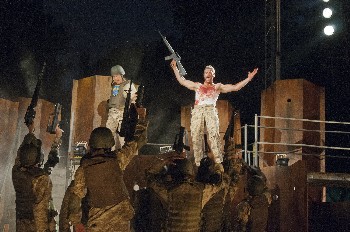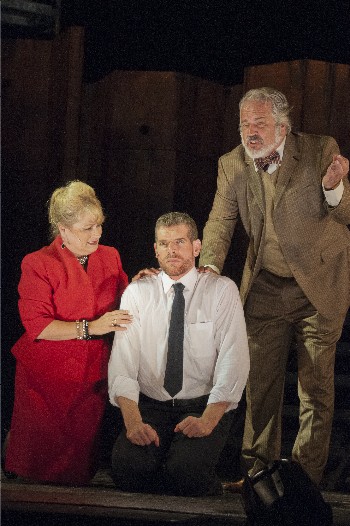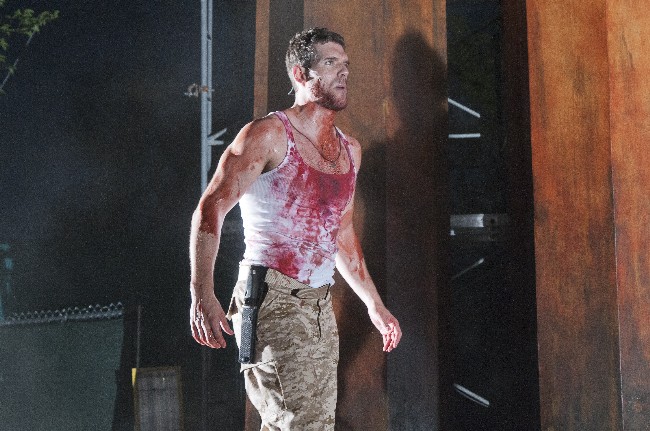Theater Review: A “Coriolanus” Cut Down to Size on the Boston Common
Shakespeare’s Coriolanus deals with the difficultly of recognizing superiority at a time of radical social breakdown, specifically when it is democracy that is in extremis.
Coriolanus by William Shakespeare. Directed by Steven Maler. Set design by Cristina Todesco. Costumes by Seth Bodie. Lighting by Eric Southern. Staged by the Commonwealth Shakespeare Company at the Parkman Bandstand on the Boston Common, Boston, MA, through August 12. Free.
By Bill Marx

Nicholas Carrière’s Coriolanus, a warrior dunked in blood, in Commonwealth Shakespeare Company’s production of CORIOLANUS. Photo: Andrew Brilliant/Brilliant Pictures
The Commonwealth Shakespeare Company’s (CSC’s) under-the-stars production of Coriolanus is plenty cinematic, to the point that its onslaught of blood squibs, knife fights, and thunderous music just about convinces you that you are sitting at a Shakespearean drive-in. But what kind of Bardic movie are we seeing?
For the first half hour or so, I was afraid that the production’s take on Coriolanus was careening down the Rambo route. Nicholas Carrière’s Coriolanus dispatches Rome’s enemies single-handedly, armed with incredible courage, an AK-47, and a fit physique. But that cut-and-dried picture of military prowess as unbeatable in war but unbearable in government is not true to the script’s marvelous ambiguity. (The text suggests a martial skill and command agility that goes beyond spraying bullets. The film Patton would be closer in spirit to Coriolanus than Rambo.)
The general isn’t just a macho maniac who disdains the city’s meek and flabby commoners, the latter, motivated by petty retaliation, banishing their arrogant-to-the-max defender. Maler falls for the Coriolanus-fascist-killer interpretation at times, pushing (twice) an image of the general’s son as a future military bully. The easy liberal takeaway seems to be “Unhappy the land that must depend on such bloodthirsty and sadistic heroes.”
In truth, Coriolanus deals with the difficultly of recognizing superiority at a time of radical social breakdown, specifically when it is democracy that is in extremis. Is Coriolanus a hero? For some readers, he is a noble warrior deserted by a fickle citizenry; for others, he is a villain threatening dictatorship. Over the years, but particularly during the twentieth century, Coriolanus has been staged from diametrically opposed political angles—as foreshadowing the rise of a Hitler and as a testament to the prescience of the people.
The best productions put these interpretations into tension without canceling either out entirely. Coriolanus should have the makings of a sublime thug, an egomaniac who denies yearning for popularity but really hungers for it, but he should also exude a genuine nobility, an intimidating demand to excel that he not only embodies through his genius as a solider, but his refusal to compromise for the sake of good-old-boy political power. He should, at the very least, fascinate us as gifted individual who stands against the crowd. Coriolanus is a man who, amid collective defeat and delusion, actually manages to do the difficult things he says he is going to do.

From left: Karen MacDonald (Volumnia), Nicholas Carrière (Coriolanus), and Fred Sullivan Jr.(Menenius Agrippa) conversing in the CSC’s production of CORIOLANUS. Photo: Andrew Brilliant/Brilliant Pictures.
Carrière, once he gets over his bang up, action-hero phase, improves, turning Coriolanus into a figure whose elemental nature is stuck (perhaps a touch psychotically?) serving a peculiar and inflexible code of sadistic honor that was cultivated in him during childhood by his mother, Volumnia. The actor is particularly effective when he sardonically courts the people’s good will (he plays the character as if he was a political candidate who, out of antic self-hatred, overplays the glad-handing role), and Carrière’s furious reaction when the popular tide turns against his character is also impressive.
The inevitably revved-up nature of CSC productions—heavily miked and broadly emotive in terms of acting so that those at the far reaches of the Boston Common can follow the action—cuts against modulation and nuance. Many of the speeches (tending toward a sonic glop because of the high volume) strike attitudes rather than provide poetic resonance. But when Carrière jolts up the vocal electricity—shouting at the members of the mob that they think they are banishing Coriolanus, but he is banishing them—the production kicks up a notch. After that cornered animal scene, Carrière sinks back into a narrow, smaller-than-life groove, never suggesting the figure’s nobility, the idea that something precious is being lost with the twists and turns this man (monster?) takes towards his destruction.
Thus this amiable but barely tragic Coriolanus makes due with a “can’t live with him, can’t live without him” interpretation that shows its dramatic limitations most strongly at the end of the play, which is admittedly a challenge. Tullus Aufidius, Coriolanus’s long-time enemy turned ally (once the exiled Coriolanus swears to crush Rome for the Voiscians), sees his chance to destroy his charismatic rival for his army’s affections. Yet, after the murder—here staged as a sort of cowardly free-for-all mugging at a military committee meeting—Aufidius acknowledges that Coriolanus was a warrior of greatness. Maurice Parent supplies Aufidius with lots of furious glowering, but the actor cannot infuse those final lines with power, so the play clunks to a close, the sight of another military bully waiting in the bullpen serving as convenient dramatic punctuation.
Coriolanus calls for something bigger, especially at its conclusion. Laurence Olivier’s general, dashing 12 feet above the stage, was speared by the Volscians, fell forward, and, according to critic Kenneth Tynan, was “caught by the ankles so that he dangles, inverted, like the slaughtered Mussolini.” Obviously this kind of chutzpah cannot be duplicated—but it should serve as a goad to the imagination.
For me, cast members have to suggest the behavior of a society that’s gone mad. It is not just the insanity of the overbearing Volumnia, who has carefully shaped her son into a unwavering prig, who is disturbed. Everyone in this fable, the military, the representatives of the populace, and the “august” consuls, manipulate language to abuse and misuse power, with the upshot that, despite all of the blood lost and huzzahs about maintaining civilization (Shakespeare mischievously suggests that Rome is saved because Coriolanus is a mama’s boy) nothing really changes. The reins of control stay firmly in the hands of the city’s 1%. William Hazlitt wrote in 1816 that “the whole dramatic moral of Coriolanus is, that those who have little shall have less, and that those who have much shall take all that others have left.” Seen from this perspective, this is very much a play for our times.
The CSC production doesn’t really go the Occupy/Presidential Election route, though there are hints of what Mitt Romney’s advisers must be going through during the scene in which the reluctant Coriolanus is being coached to sound enough like a normal human being to fool the people. At the beginning of the play, Rome’s populace is starving (Elizabethan audiences knew what famine meant—the play premiered right after the “Midlands Riots,” which had been triggered by a bad harvest, an inflation of food prices, and the illegal enclosure of common land). Here the complaining “citizens” are played by a motley (and mugging) crew of mostly young performers who don’t evoke much dangerous desperation of any kind. The riot police show up, but it’s a waste of their time.
As the fast-talking politico and father figure to Coriolanus, Menenius Agrippa, Fred Sullivan Jr., sells rhetorical snake oil to the people with ease, but the actor lacks the force to convey the dawning self-knowledge and black despair that sets in once Coriolanus flicks the character away. As Cominius, Robert Walsh contributes a solid portrait of Roman military authority. Karen MacDonald’s Volumnia is not an imperious wanna-be aristocrat but a delicious street fighter—the actress makes good use of the role’s high flown language and low ball tactics in the scene when she pleads for Rome’s survival, triggering her son’s guilt when she suggests that he doesn’t love her. As the people’s representatives who lead the charge against Coriolanus, Jacqui Parker and Remo Airaldi are lively if tilted, unnecessarily, toward the opportunistic. They should be having more fun—it must be exhilarating to win such a political victory, and it just could be that Coriolanus would be as bad at governance as they think.
The CSC cuts Coriolanus down to size for the sake of a safe anti-war message (the most successful of a bad lot is gone), when the real challenge would be to do justice to Shakespeare’s insistence that there is nothing certain about our ideas of the heroic, that discerning what is “absolutely” good for society depends on who is doing the defining and when. As Aufidius sourly observes once his rival’s fortunes plummet, “our virtues/ Lie in th’ interpretation of the time.”
Tagged: Commonwealth-Shakespeare-Company, Coriolanus, Nicholas Carrière, Steven Maler


Spot on, Bill, concerning the lack of “modulation” by the actors. Technically, volume was painfully loud sitting within good viewing distance of the stage — to the point that a number of people left at intermission.